
Chandigarh: Punjab Water Supply and Sanitation Minister Bram Shanker Jimpa on Wednesday said the government would forge strategic partnership with Israel for developing a better water management system.
He said the government would work on making effective use of Israeli technology and indigenous innovations to develop a cost-effective and sustainable water supply and sewerage infrastructure in the state.
Speaking at the Roundtable with Lior Asaf, Water Attache, Embassy of Israel, Neeraj Gahlwat, Senior Water Resources Specialists, International Development Cooperation (MASHAV), Embassy of Israel, and Amit Dhir, Professor, Thapar University, here, the minister appreciated the role played by Israel in supporting India in addressing water and wastewater challenges.
He said the government has been concerned with the depleting groundwater levels in the state and efforts are being made to improve the water quality of ponds in rural areas.
He said the groundwater availability in the villages has significantly gone down during the last 35-40 years.
Accentuating rainwater harvesting as one of the important aspects of groundwater recharge, the minister said that the government has made it mandatory for all buildings in the state. He also shared his experience of visiting the wastewater treatment plants in Hoshiarpur, where wastewater is being reused for agricultural purposes.
Extending support to Punjab in adopting new technologies, Asaf mentioned that in Israel’s water sources almost half came from desalinated, recycled and recharged water, whereas till 1980s the country was dependent on the use of natural water only.
“Israel has developed technologies that enable reuse of 90 per cent of treated wastewater. Every STP in Israel is developed close to agricultural lands and is connected to irrigation,” he said.
Presenting case studies, he said, “Solutions required in India are similar to the solutions developed by Israel. Community engagement, capacity building of stakeholders, private sector participation plays a key role in successfully addressing challenges around water quality, sanitation and groundwater recharge.”
D.K. Tiwari, Principal Secretary, Water Supply and Sanitation Department, said the government is developing climate resilient rural water supply schemes by switching to surface water supply.
It aims to develop 500 smart villages with round-the-clock water supply, sanitation facilities with an estimated cost of Rs 4,500 crore.
The department is also undertaking management of wastewater and solid waste by setting up block level plastic waste management units and material recovery facilities, model biogas plants, faecal sludge treatment plants, etc., with an estimated cost of Rs 1, 300 crore, he added.



